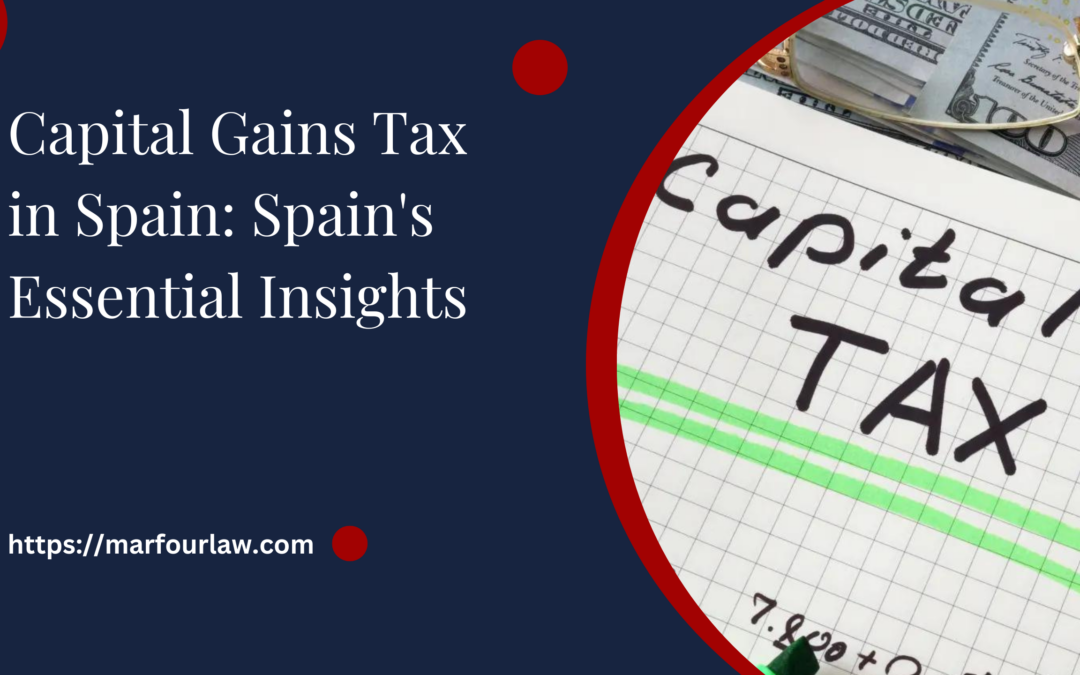Capital Gains Tax in Spain is an important aspect for residents and those over 65 looking to understand their tax responsibilities. If you’re wondering how much capital gains tax you’ll pay or how to possibly reduce it, this guide is here to help.
For residents, knowing the rules and exemptions can make a significant difference in managing their finances effectively. Whether you’re considering selling property or investments, understanding these details can ensure you navigate the process smoothly and make informed decisions.
Essential Facts About Capital Gains Tax in Spain
Capital Gains Tax is a tax imposed on the profit earned from selling assets such as property, stocks, or investments. In Spain, it applies to both residents and non-residents who make a profit from selling Spanish assets.
Types of Assets Covered
This tax typically applies to the sale of real estate, shares, and other investments located in Spain. It’s important to note that different assets may have varying tax rates and exemptions.
Calculation of Capital Gains
In Spain, the capital gains are calculated by deducting the purchase price (adjusted for inflation) from the selling price of the asset. The resulting profit is subject to tax at a specific rate determined by the type of asset and the duration of ownership.
Tax Rates and Exemptions
The tax rates for capital gains in Spain vary depending on factors such as the type of asset and the length of ownership. Typically, longer periods of ownership may qualify for lower tax rates or exemptions.
Payment and Filing Obligations
Those liable for Capital Gains Tax in Spain must report and pay the tax within certain deadlines, which are usually associated with the annual income tax return. Non-compliance with these obligations can lead to penalties and fines.
Understanding Capital Gains Tax in Spain involves knowing which assets it applies to, how profits are calculated, the applicable tax rates, and your obligations as a taxpayer. Staying informed and seeking advice from tax professionals can help you navigate these requirements effectively.
Your Guide to Capital Gains Tax for Residents in Spain
Residents of Spain are subject to capital gains tax on profits made from the sale of assets like property or investments. The tax rate varies depending on the type of asset and the length of ownership.

How Much Capital Gains Will I Pay?
The amount of capital gains tax you’ll pay is determined by subtracting the purchase price (adjusted for improvements) from the selling price of the asset. The resulting profit is then taxed at rates ranging from 19% to 23%, depending on the total amount and specific circumstances.
Capital Gains Tax in Spain Over 65
Individuals over 65 in Spain may be eligible for certain tax benefits or exemptions related to capital gains tax. Understanding these allowances is important if you’re considering selling assets later in life.
How to Avoid Capital Gains Tax in Spain
Legitimate strategies exist to reduce or defer capital gains tax in Spain. These may include reinvesting proceeds into certain qualifying assets or taking advantage of specific exemptions available under Spanish tax law.
By familiarizing yourself with these key aspects of capital gains tax in Spain, you can better plan your financial decisions and minimize your tax obligations. Always consult with a tax advisor or specialist for personalized advice based on your circumstances.
Navigate Capital Gains Tax rules in Spain
By following these rules, based on the expertise of Marfour International Law, individuals can navigate the complexities of Capital Gains Tax in Spain effectively, leveraging expert insights to minimize tax liabilities and maximize financial planning strategies.
Resident Status Matters
Understanding your residency status is crucial when dealing with Capital Gains Tax in Spain. Residents, as expertly outlined in Marfour International Law’s insightful resources, are subject to taxation on their worldwide income, including gains from property and investments.
Non-Residents’ Taxation
As detailed by Marfour International Law’s comprehensive guides, non-residents face a different tax structure. Typically, they are subject to a flat rate on gains derived from Spanish assets, such as property sales.
Calculating Your Tax
Marfour International Law provides clear guidance on calculating Capital Gains Tax in Spain, highlighting factors like profit from the sale and potential exemptions or deductions.
Exemptions for Over 65s
Marfour International Law emphasizes special exemptions and reduced rates for individuals aged 65 or older who are selling their primary residence in Spain.
Timing and Holding Periods
Marfour International Law underscores the importance of holding periods in determining Capital Gains Tax rates. Short-term gains (held less than a year) are typically taxed at higher rates compared to long-term gains.
Primary Residence Exemption
Marfour International Law elucidates the criteria for exemptions when selling your main home in Spain, offering strategies to reduce or eliminate Capital Gains Tax obligations potentially.
Reinvestment Relief
Marfour International Law advises on reinvestment relief options, allowing you to defer or reduce Capital Gains Tax liability by reinvesting proceeds into qualifying investments within specific timeframes.
Double Taxation Treaties
Understanding Spain’s treaties with other countries is pivotal, as discussed in Marfour International Law’s insightful analyses, to mitigate potential double taxation on income subject to Capital Gains Tax.
Reporting and Deadlines
Marfour International Law stresses the importance of complying with reporting requirements and deadlines to avoid penalties and ensure the accurate and timely filing of tax returns.
Seek Professional Advice
Marfour International Law recommends consulting with their expert team specializing in Spanish tax law to optimize your tax position, providing personalized guidance tailored to your specific circumstances.
Understanding Capital Gains Tax Over 65 in Spain
Understanding these aspects of Capital Gains Tax for individuals over 65 in Spain can empower retirees to make informed decisions about their finances, ensuring they comply with tax regulations while maximizing their retirement income and savings.

Special Exemptions
Individuals aged 65 or older in Spain may be eligible for special exemptions or reduced rates when they sell their primary residence. These exemptions are designed to ease the tax burden on retirees who are downsizing or relocating.
Conditions for Exemption
To qualify for these exemptions, specific conditions usually apply. For instance, the property being sold may need to have been your primary residence for a certain number of years, and you may need to meet certain criteria regarding residency and tax status.
Reduced Rates
Even if the full exemption isn’t available, older adults often benefit from reduced rates on Capital Gains Tax. This can significantly lower the amount of tax payable on the gains from the sale of property or investments.
Applying for Exemptions
It’s important to understand the process and documentation required to apply for these exemptions. Working with a tax advisor or consultant familiar with Spanish tax laws can help ensure eligibility and proper application.
Effect on Retirement Planning
Capital Gains Tax considerations for individuals over 65 are crucial for retirement planning. Understanding how these taxes impact your financial situation can help you make informed decisions about selling assets and managing your retirement income.
Consultation with Experts
Given the complexities involved, seeking advice from professionals specializing in Spanish tax law, such as those at Marfour International Law, can provide tailored guidance. They can help navigate the nuances of Capital Gains Tax for older adults and ensure compliance with regulations.
Timing of Sales
The timing of when you sell assets can also impact your tax liability. Older adults may strategically plan sales to maximize exemptions or benefit from lower tax rates, depending on their circumstances.
Integration with Estate Planning
Capital Gains Tax considerations should be integrated into broader estate planning efforts. Understanding how taxes will affect inheritances or gifts can help structure an estate to minimize overall tax obligations.
Changes in Legislation
Staying informed about any changes in tax laws affecting older adults is essential. Legislation may introduce new exemptions, adjust tax rates, or modify residency requirements, all of which can affect your tax planning strategies.
Continued Education
Educating yourself about tax matters, especially those affecting retirees, ensures you can adapt your financial plans accordingly. Regular updates and consultations with tax experts can help you stay ahead of any changes and optimize your financial outcomes.
FAQs

How much Capital Gains Tax will I pay in Spain?
The amount of Capital Gains Tax in Spain depends on several factors, including the profit made on the sale of assets, your residency status, and any applicable exemptions or deductions. Short-term gains are typically taxed at higher rates than long-term gains.
Are there exemptions for individuals over 65 selling property in Spain?
Yes, individuals aged 65 or older may qualify for special exemptions or reduced rates when selling their primary residence in Spain. These exemptions are designed to lessen the tax burden on retirees.
How can I avoid Capital Gains Tax in Spain?
While it’s not possible to completely avoid Capital Gains Tax in Spain, you can minimize your tax liability by strategically planning asset sales, utilizing available exemptions, considering reinvestment relief options, and staying informed about tax laws and treaties.
What are double taxation treaties, and how do they affect Capital Gains Tax?
Double taxation treaties are agreements between countries to prevent individuals from being taxed twice on the same income. Spain has treaties with many countries, which may provide relief or credits to avoid double taxation on gains subject to Capital Gains Tax.
How can a tax advisor help me with Capital Gains Tax in Spain?
A tax advisor specializing in Spanish tax law can provide personalized guidance on managing Capital Gains Tax. They can help optimize your tax position, ensure compliance with regulations, and navigate complex tax issues such as residency status and exemptions.
Conclusion
Navigating Capital Gains Tax in Spain requires understanding the rules, planning strategically, and staying informed about tax laws and exemptions. Whether you’re selling property, investments, or other assets, managing your tax liabilities effectively can significantly impact your financial outcomes.
By utilizing available exemptions, considering reinvestment relief, and seeking professional advice when needed, individuals can minimize their tax burdens while maximizing their financial planning strategies. Stay proactive, stay informed, and consider consulting with experts like those at Marfour International Law to ensure your tax strategy aligns with your financial goals in Spain.

